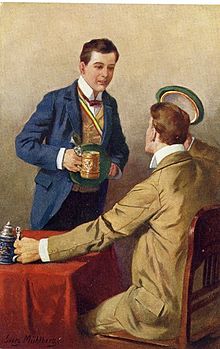Schmollis

The expression Schmollis (also: Smollis , Schmolles ) is documented as early as 1795 as an acclamation among students combined with the request to drink brotherhood and thus maintain a more intimate relationship. Even today, drink some frat boys Schmollis when they duzen want.
The origin of the word is unclear. In student history literature, the term is generally derived from the Latin sis mihi mollis amicus (German roughly: "Be a close friend to me!" Or "Be devoted to me!"). According to the German dictionary of the Brothers Grimm , it is more likely that the term comes from the Dutch smullen (feast, prassen). The affirmative answer was, documented since 1795, the exclamation “ Fiducit! ", As a short form of fiducia sit " Es gelte! "(From Latin fiducia : contract, agreement).
In some student associations , it is common for the president of a student pub to shout out after a song by the Kneipgesellschaft ( Corona ): “A Schmollis to the jolly singers!”, To which the participants respond with “Fiducit”.
18th century
In the Latin treatise Dissertatio de norma actionum studiosorum seu by the Burschen-Comment , the oldest known report published in 1780 on special student customs in the German-speaking area, the term Schmollis is mentioned in Section VIII and explained in a note. However, the author appearing under a pseudonym only refers to the complete emptying of the drinking vessel and not to any changes in the social relationships of those involved.
| § VIII. | |
| 2 B). Neminem dictata pocula (SCHMOLLIS *) recursare debere etsi decies vomuerit. ... | Nobody can refuse to drink the glasses dictated to him or a pout, and if the stomach has already turned ten times. ... |
| *) Schmollis nonnulli derivant a verbo obsoleto "pout", ie efflare, extollere se, nempe prae aliis bibendo se ostendere, pout passim idem est, ac indignationem et iram fovere; sed haec significatio vix hic locum habere potest. Alii vero a verbis “narrow out”, seu contracte “narrowly”, pro “pure out”, ie vitrum ad ultimam usque guttulam ebibere. | Some derive the word pout from the old pout, that is, puff yourself up, make yourself big when you can actually drink others on the ground. Sulking also means here and there: persistently angry, reluctant to be. But this meaning does not concern us here. - Others claim that it comes from "Schmal aus", pure from, from which afterwards Schmal us, and finally pout and pout. So drinking a Schmollis is hot. Empty the glass down to the last drop. |
| Christian Friedrich Gleiß (author) 1780 | Nikolaus Balger (translator and commentator) 1798 |
From this source one can deduce that the original meaning was roughly equivalent to “drinking”, i.e. emptying the drinking vessel in one go without stopping. But as early as the end of the 18th century, the word was transferred to brotherhood drinking, which was probably firmly linked to such a drinking custom and is partly to this day.
In his strongly autobiographical text, ETA Hoffmann describes the life of the cat Murr from 1821, depicting scenes from the poet's life, alienating them from the world of cats. Large parts of the work reflect the poet's studies at the University of Königsberg from 1792 to 1795. Here he is introduced to the customs of student life ( Comment ) by an experienced "cat" named Muzius . However, the experienced student forbids himself to be too confidential at the beginning:
- "About it," Muzius snapped angrily, "about it another time, but don't call me you , I forbid that, but you , until we've had a pout . - But you are a Philistine and you don't know how to comment. "
In the late 18th century, the salutation "Ihr" was common as a respectful salutation for senior or elderly people, while "Sie" was used as a familiar form of address among friends.
19th century
The former Göttingen student Daniel Ludwig Wallis explained some student expressions in the appendix to his book about the Göttingen student life, which was published in 1813, including the Schmollis:
- To pout or pout means to drink brotherhood. There are some peculiar formalities that you empty your glasses with your arms crossed, then give each other a brotherly kiss, shake hands with the words: “Stay my friend; My name is Y and I'm from Z. "
- Smollis also Schmollis is the address of the one with whom one wants to drink brotherhood. This then toasts and says: Fiducit! The brotherhood itself is also called Smollis. "I drank Smollis with him."
Heinrich Heine , who studied a little later in Göttingen, used the term in his book of songs, here as a metaphor for the suicide of a student who "drank Smollis when he died":
- I curse the women and rich scoundrels,
- And mixed devil's herbs in the wine
- And with the death I drank Smollis,
- Who said: Fiduzit, my name is friend Hein !
- Heinrich Heine (from 1819 Stud.iur. In Bonn, Göttingen and Berlin), "Book of Songs", (1a VIII)
Elias Salomon wrote the poem »Fiducit« in 1835, which was set to music by August Wilhelm Briesewitz .
Individual evidence
- ↑ Erich Bauer : Schimmerbuch for young corps students , 4th edition, Verden 1971, p. 50 ("Das Schmollistrinken")
- ↑ Hans Peter Hümmer: The "Burschen-Comment" of Martialis Schluck von Raufenfels. The Latin version from 1780 and the first German translation from 1798. In: Einst und Jetzt. Yearbook 2007 of the Association for Corps Student History Research , Neustadt an der Aisch 2007, p. 29, ISBN 978-3-87707-690-4
- ^ ETA Hoffmann : Views of the life of the cat Murr in the Gutenberg-DE project
- ^ Ludwig Wallis: The Göttingen student. Or remarks, advice and instructions about Göttingen and student life on the Georgia Augusta , Göttingen 1813, p. 112f.
- ↑ Elias Salomon "Fiducit"

